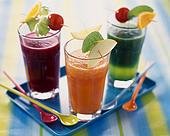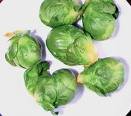 Juicing is big business. According to the consumer research group Mintel, the UK fruit juice market is worth around £1.4bn a year. Smoothies and juices are the biggest boom area in a total non-alcoholic drinks market that rose by 26% between 2000 and 2004 alone. Drinking fresh juice is an undoubtedly healthy way to get more fresh fruit and veg into your system. According to Jason Vale, however, to get maximum nutrients, "Juice must be unpasteurised, made only with fresh and raw ingredients, no concentrates or added sweeteners." This is something that bottled products and some juice bars don't always achieve.
Juicing is big business. According to the consumer research group Mintel, the UK fruit juice market is worth around £1.4bn a year. Smoothies and juices are the biggest boom area in a total non-alcoholic drinks market that rose by 26% between 2000 and 2004 alone. Drinking fresh juice is an undoubtedly healthy way to get more fresh fruit and veg into your system. According to Jason Vale, however, to get maximum nutrients, "Juice must be unpasteurised, made only with fresh and raw ingredients, no concentrates or added sweeteners." This is something that bottled products and some juice bars don't always achieve.But sometimes the juice hype is scientifically shaky. "Our colons are clogged with rotting food and cannot absorb nutrients properly" says Vale, so "our cells are starved". "Think of your digestive system as the clogged M25 at rush hour on a bank holiday weekend," he suggests. "Juice is a fast motorcycle courier bypassing the blockage".
This is a great image, but according to Dr Adam Harris, consultant gastroenterologist at Kent and Sussex hospital, and honorary secretary of the British Society of Gastroenterologists, biologically inaccurate. If your colon was blocked or your digestion not functioning or absorbing nutrients properly, you would be very obviously ill. "Some disease processes such as a tumor, diverticular disease, inflammatory bowel disease and severe constipation can narrow the diameter of the colon," Harris explains. "In the absence of disease, the only thing found in the lumen [lining] is faeces, which is entirely normal. If it wasn't, we would all be sitting on the loo all the time."
Food is not rotting in the gut because "peristalsis means that food moves continuously through the small intestine". Drinking juice to speed things up or bypass "blockages" is therefore pointless. As for juice helping your body to absorb nutrients: "While unusual diseases such as Crohn's disease can affect absorption [in the small intestine]," says Harris, "if your small intestine was not absorbing nutrients properly, the last thing you would need would be a juice diet because the first symptoms of a disease in the small intestine that affects absorption of nutrients and calories would be weight loss and profound watery diarrhoea." The colon itself, he adds, is a "waste pipe" that only absorbs water.
The other main claim for juicing is that it will detox your body. Again, according to Professor Sir Colin Berry, professor emeritus of pathology at Queen Mary's Hospital, London, this notion is incorrect. "Detoxification in the popular sense of the word is completely meaningless," he says. Your body is 'detoxing' itself all the time: your gut and skin prevent bacteria and many toxins from entering the rest of your body, but when harmful chemicals do get through, the liver acts as a kind of chemical factory, combining them with its own chemicals to make water-soluble compounds that can be excreted by the kidneys [as urine].
"The human body works at a fixed rate for many of its detox processes, which can't be speeded up in any useful way," says Berry. Even special juice blends, or the juice of particular fruits such as pomegranate, star fruit, acai berries or any other trendy "superfoods" do not have magical powers to remove toxins from the system. Some fruits or vegetables do contain more of certain nutrients than others, but, says Lisa Miles, a nutrition scientist at the British Nutrition Foundation, "There are no specific foods that help us to remove toxins from our bodies."
The only nutritional difference between eating a carrot, and drinking the juice of one, however, is the fibre content. This is why, says Miles, "Juice, fruit or vegetable, only counts as one portion a day [of the five recommended], regardless of how much is drunk. Juice has little fibre." Juicing "also 'squashes' the natural sugars out of the cells that normally contain them, which means that drinking juice in between meals isn't good for your teeth".
Most people, of course, embark on juice diets to lose weight. One New Yorker's blog about dropping 12lb in one week on the Juice Master diet says it all: "Today I ate: 1 Lemon Tea ... 1 Super Juice with psyllium husk. That's IT!". There is, then, no magic to juice: you lose weight because you consume fewer calories. However, says Dr Helen Croker, clinical research dietician at University College London, some of this dramatic weight loss will not be fat. "It is not physiologically possible to lose that much fat in one week," she explains. "You can lose a maximum of 2-4lb of body fat in one week but beyond that the weight lost will be your body's fuel reserves and water." Start eating again and you will regain some, if not all, of the weight.
The main advantage of juicing is that because the pulverised raw materials can taste good, it may encourage you to consume more fruit and vegetables. According to Cancer Research UK, studies show that those of us who eat a lot of fruit and vegetables have a lower risk of certain cancers. Jordan was reputedly juicing spinach for breakfast which, Vale maintains, if juiced with something tasty can be made palatable even if you can't stand greens. "If you can't eat it," he says, "drink it."
OK, Vale, I've tried some drinks with spinach in and I'm not convinced they taste more palatable at all. I've never been one for eating my greens and these drinks aren't making it any easier. The more I look into the supposed benefits of drinking these juices the more sceptical I get. I am religiously (well sort of) drinking these juices and I'm not really feeling much different. My energy levels did get a boost at first but that has plateaued now. I am beginning to wonder if all the claims that drinking these juices will make you healthier are false and it's all in your head.
As my energy is not seeing much improvement I tried a recipe from the 'energy booster' section of my book. It was called 'battery charge' (kiwifruit and grapes). Yep I played it safe on the ingredients front as I didn't fancy a repeat of the beetroot incident. This one was very fruity and a light green in colour, very drinkable. Rating 4/5.
I got to the end of the day and realised I hadn't had my second 'fix' so had to have one before I went to bed. My supply of fruit and veg is running rather low so I decided to just chuck anything in and hope for the best.
This is what I came up with red pepper, tomato, fennel and lime - a very interesting mix and I was quite concerned that it would make me very ill indeed! Actually this was OK and tasted mostly of lime so it didn't make me ill. I will call this one 'pleasant surprise'.
Today's Ratings (out of 5)
Energy: 3
Hassle:5
Benefits:1









1 comment:
I really love greens.
With your post, I have loved more..
Thanks a lot for the post.
Work from home India
Post a Comment